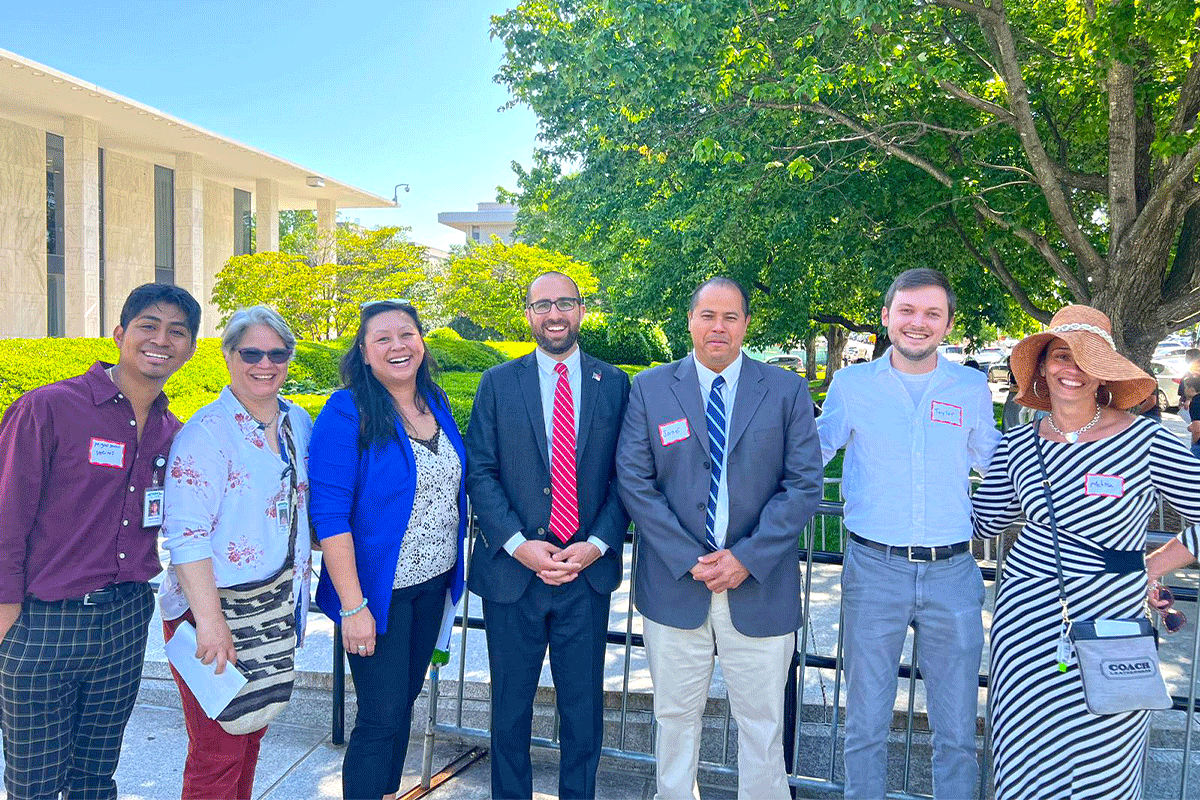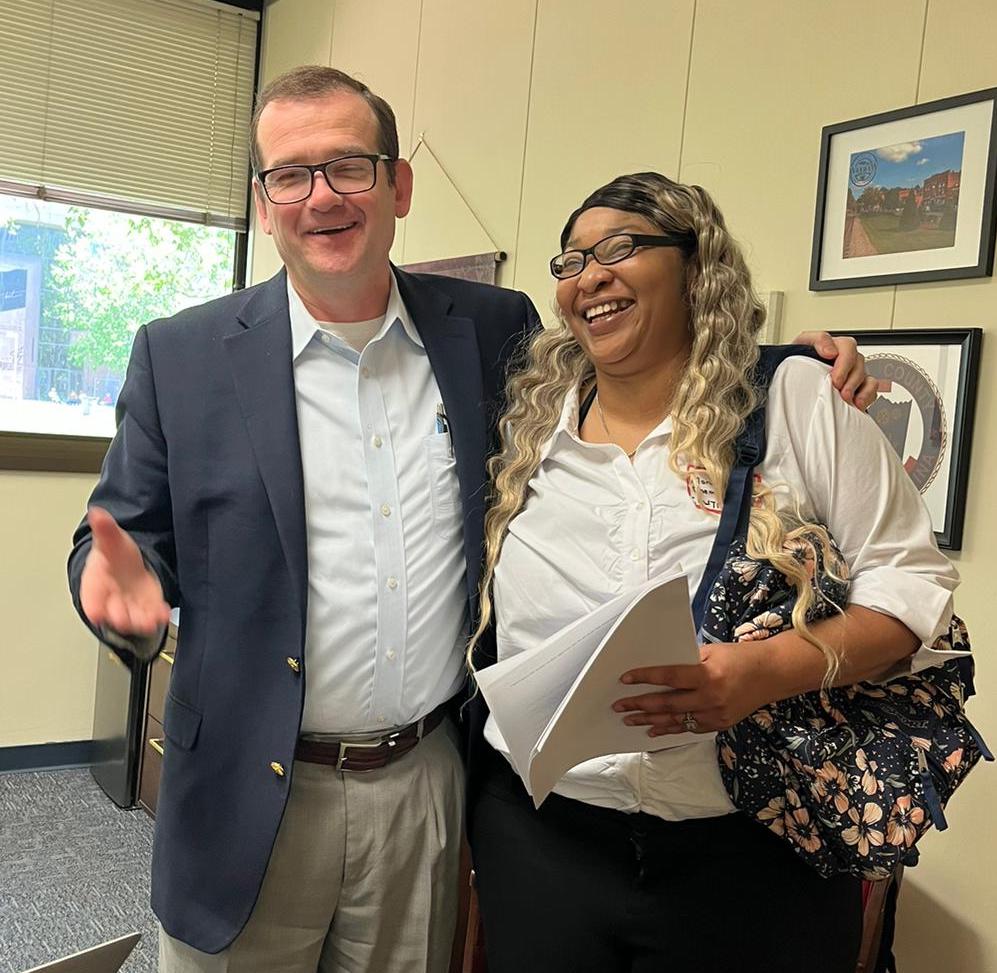"We've got to stick together": Community health workers advocate at North Carolina capitol
Community health workers from across the state gathered for an Advocacy Day, aiming to educate representatives and safeguard vital services
Posted on Jun 27, 2023

On April 19, over 80 community health workers from 24 counties across North Carolina descended on the state’s capital, Raleigh, for an Advocacy Day to educate representatives about their profession and make their voices heard throughout the halls of power. After arriving a bit nervous, Monique Onema, a certified peer support specialist and community health worker from Cabarrus County, felt encouraged after she was able to help her representative reframe his perception of community health workers.
“[My elected official] was telling me how he was helping a gentlemen get housing and get into treatment, and I explained to him that’s exactly what we do too. I said, ‘See, you’re a community health worker too,’” explained Monique.
For advocates like Monique, this trip to the capital came at a time of uncertainty. As the federal government discontinues funding supporting state-led public health programs launched in response to COVID-19, Monique and her colleagues fear that the key social supports they’ve been demanding for decades – services like housing support, healthy foods, and public transportation - are once again at risk.

Over the last three years, North Carolina has invested roughly $75 million dollars of pandemic funding into training, certifying, and employing nearly 800 community health workers to support the COVID-19 response in the most rural and underserved areas of the state. This investment helped community-based organizations and local health systems develop outreach and social support programs for thousands of people affected by the pandemic. Without additional investments, there is no clear path to ensure this critical work continues. Community health workers are key trusted messengers, system navigators, and health equity champions. That’s why PIH-US and our partners are mobilizing community health workers as we encourage decision-makers to champion policies and initiatives that prioritize this essential workforce.
Since PIH-US' initial engagement in North Carolina in May 2020, we have supported a growing network of public health implementers and community-based organizations like Monique’s to elevate community health worker voices at the state and federal levels. As a strategic thought partner and advisor to North Carolina’s Department of Health and Human Services (NCDHHS), the North Carolina Community Health Worker Association (NCCHWA), and additional partners within the NC Community Health Worker Initiative, PIH-US works to strengthen the statewide infrastructure for community health workers including training, certification, employment, and systems integration, while also developing sustainable financing mechanisms to assure the long-term success of this workforce.
Organizations like NCCHWA, which co-hosted the Advocacy Day with PIH-US in April, are elevating the impact of this workforce on communities across the state and urging legislators to support plans to sustainably integrate community health workers into North Carolina’s public health infrastructure.
“Community health workers were spotlighted during COVID-19, but we’ve been here for decades. We are the bridge between underserved communities and health systems, ensuring that families across North Carolina have the resources needed to not just survive, but to thrive,” says Honey Estrada, NCCHWA’s president and a proud community health worker. “The work we do is valuable and needs to be respected as such.”
This drive to raise awareness is what led to such a strong turnout for the Advocacy Day in Raleigh, where community health workers were able to meet with over 50 elected officials. In addition to meeting with state legislators, community health workers had the opportunity to connect with peers from across the state and share their experiences. As Josymar Garcia, a member of the U.S. Army reserve and a community health worker from Kinston, North Carolina, put it, "We're the frontline workers. We’re the ones going into people’s homes and going into the migrant camps. We’ve got to stick together.”
To prepare community health workers like Josymar and Monique for the Advocacy Day, PIH-US and NCCHWA hosted a series of trainings on legislative advocacy to ensure that attendees felt comfortable and confident sharing their stories and advocating for their communities to policymakers. After meeting with his local representatives, Josymar told us, “Coming from a Hispanic background, it’s not very often we’re able to spread our voices. Being able to advocate for the people that we serve, both Hispanics and other ethnicities, made us feel really good. It was awesome to be able to speak to them in person.”
NCCHWA is hoping that advocacy efforts like Josymar’s lead to concrete policy change at the state level. “We’re in conversations with decision-makers about the state budget and how community health workers fit into the fabric of North Carolina’s public health system. We’re hoping to continue working with our partners at NCDHHS and the General Assembly to craft a sustainable and integrated role for community health workers to continue supporting communities across North Carolina,” said Honey.
Looking forward, PIH-US is supporting community partners to build out these advocacy efforts and implement health equity initiatives across North Carolina. As for Monique, she plans to continue to share her experience to inspire action.
“Advocacy is a hugely important part of the work that we do,” she said. “We are the voice for others when they can’t have a voice themselves – and I am so proud to be a part of it.”

